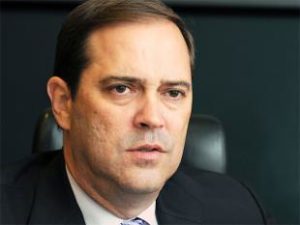 India and the US have ramped up their defence and strategic ties by agreeing to fast-track co-production ventures as their defence ministers held wide-ranging talks on regional and global security issues besides discussing the growing menace of terrorism.
India and the US have ramped up their defence and strategic ties by agreeing to fast-track co-production ventures as their defence ministers held wide-ranging talks on regional and global security issues besides discussing the growing menace of terrorism.
Defence Minister Manohar Parrikar and his American counterpart Ashton Carter held one-and-a-half hour long closed door discussions yesterday during which the two leaders “reviewed the cooperation between our armed forces which have grown stronger”.
Parrikar said India and US share a strategic partnership that reflects their shared values and interests. Defence and security cooperation is a vital component of this partnership, he said.
Describing the Indo-US defence partnership as an anchor of global security, Carter said the Obama Administration is ready to further strengthen this relationship.
“The Indo-Asia-Pacific is one of the most consequential parts of the world for America’s future. And we welcome India’s rise as a security partner in a region where half of humanity lives, and half of the world’s economic activity takes place,” Carter told reporters at a joint news conference with the visiting Indian Defence Minister.
Carter informed Parrikar that the US has updated its policy on gas-turbine engine technology transfer to India to expand cooperation in production and design of sensitive jet engine components.
As a result of this policy update, Carter said that the US will be able to expand cooperation in production and design of sensitive jet engine components.
Carter and Parrikar look forward to US companies working with their Indian counterparts to submit transfer requests that will benefit from this updated policy, said a joint statement.
During the meeting, the two leaders discussed ways and means to move the ambitious Defence Technology and Trade Initiative (DTTI) forward.
Expressing satisfaction with DTTI progress to date, the two committed themselves to identifying additional projects for possible co-development and co-production of high technology items that meet the transformational intent of DTTI, the joint statement said.
This was the third meeting between the two leaders in less than six months.
Yesterday the two leaders stayed together for nine hours, including four hours abroad USS Eisenhower, a nuclear-powered aircraft carrier.
“Through our meetings today and expanded cooperation in the days to come, the US-India defence partnership will become an anchor of global security, as together, we work towards a common future, a common future between the United States and India that is destined,” Carter said.
“This is a relationship that will be critical in strengthening the Indo-Asia-Pacific security architecture, so that everyone there can continue to rise and prosper,” said the US Defence Secretary.
Carter said he and Parrikar discussed the progress that has been made towards cooperation on jet engines and aircraft carrier design and construction as well as opportunities to collaborate on additional projects of interest, which will also further Prime Minister Narendra Modi’s ‘Make in India’ policy.
Parrikar said their desire is to further collaborate in the higher-end technologies within the framework of DTTI.
“The assurance I have, and I am confident of that India is placed at a level which would ensure that red tapism is cut. I think this is the biggest take home one can get. We have got a very clear promise and we have been experiencing it that our issues are fast-tracked,” he told reporters.
Parrikar said some US companies have shown interest in setting up manufacturing base in India for fighter jets for which India has asked the Pentagon if there is any advance clearance system from their side.
“They (US) are very positive on that,” the Minister said adding that the US side has indicated that pre-approval could be considered on all such proposals coming from companies like Boeing and Lockheed.
As many as 17 new ideas for cooperation under the DTTI are also being discussed.
“We have identified many new areas for cooperative research and development, and both sides are committed to continue to exchange ideas in the search for additional projects for possible co-development and co-production that meet the spirit of DTTI,” he said.
Both sides said that progress has been made on the Defence Technology and Trade Initiative (DTTI) pathfinder projects which include the Raven mini Unmanned Aerial Vehicles (UAVs), “roll-on, roll-off” mission modules for C-130J aircraft, Mobile Electric Hybrid Power Sources (MEHPS) and Next Generation Protective Ensemble (NGPE) for soldiers.
The two leaders discussed range of regional security issues, including the threat posed by the Islamic State and entities such as Al-Qaeda and its affiliates, Lashkar-e-Taiba, Jaish-e-Mohammad, D Company, the Haqqani Network and other regional terror groups, according the joint statement.
Parrikar said in all his meetings in the US, terrorism was one of the key issues of discussions with American leadership.
“The issue of terrorism was a key topic discussion in all engagements Terrorism has become a global phenomenon and requires a comprehensive response. Terrorists of all shades and affiliations must be countered without any differentiation,” he told reporters.
Carter said terrorism of all kinds in South Asia has been and remains a serious problem. India, he said, has been attacked and is continuously threatened with attack from terrorists. However, India has ruled out any enhancement of its role
in the Middle East in view of the emergence of deadly ISIS in Syria and Libya.
Parrikar said there has been no change in India’s policy on participating only in UN approved peacekeeping missions.
But India is and has been sharing intelligence with the US on issues related to terrorism, he said.
Source: http://www.business-standard.com/article/pti-stories/us-india-to-boost-defence-ties-fast-track-co-production-115121100316_1.html
 With a checklist regime kicking in for initial public offerings (IPOs), capital markets regulator the Securities and Exchange Board of India (SEBI), has put in place a new form for ASBA (Application Supported by Blocked Amount) facility.
With a checklist regime kicking in for initial public offerings (IPOs), capital markets regulator the Securities and Exchange Board of India (SEBI), has put in place a new form for ASBA (Application Supported by Blocked Amount) facility.




